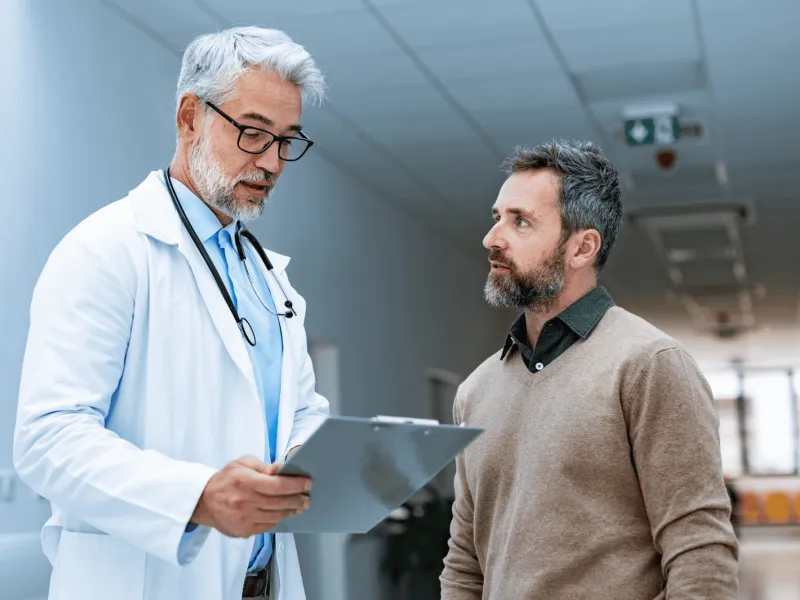
Your Gastrointestinal (GI) Cancer Care Specialists
All your body’s systems are intricately connected. They work together in concert to keep you whole. When one of those systems is down, it affects your whole health. That’s why when you’re faced with a gastrointestinal cancer diagnosis, we do more than just treat the cancer in your body; we provide whole-person care that addresses your physical, emotional and spiritual health needs — all of which require special care as you face your diagnosis.
Your highly respected digestive wellness experts at AdventHealth are renowned for leading the charge against gastrointestinal cancers — including stomach, liver and pancreatic cancers — by participating in many of the latest clinical trials, providing multidisciplinary approaches and gently guiding you through your treatment plan. We'll keep you informed through every phase, help you channel your strength, cheer you on and lead you down a path to whole-person well-being.

What Is Gastrointestinal Cancer?
Gastrointestinal (GI) cancer refers to a type of cancer that occur in the organs of the digestive system, which include the esophagus, stomach, liver, pancreas, gallbladder, small intestine, colon and rectum. GI cancers can vary widely in their characteristics, symptoms and treatment approaches, but they all involve the abnormal and uncontrolled tumors within the digestive tract.
We’re by Your Side Every Step of the Way
Get an Accurate Gastrointestinal Cancer Diagnosis
Wellness is within reach. Catching gastrointestinal (GI) cancer in the early stages gives you more treatment options — and a higher possibility of positive outcomes. But getting there means asking all your questions and working through the answers together. At AdventHealth, we pave the way by providing a safe, soothing diagnostic environment and giving you the latest in genetic counseling, testing and imaging. Our imaging experts aim for same-day diagnostic test results so you can get answers and start treatment faster. We put the focus on giving you the full picture by offering minimally invasive diagnostic testing that includes the following:
- Physical Exam and Medical History
-
Doctors start with a physical exam and a review of symptoms and family history to assess cancer risk.
- Endoscopy Procedures
-
These procedures use a flexible tube with a camera to view inside the digestive tract. Depending on the area of concern, this could include:
- Colonoscopy for the colon
- Upper endoscopy for the esophagus and stomach
- Endoscopic ultrasound (EUS) for close imaging of the stomach, pancreas and esophagus
- Imaging Tests
-
CT scans, MRI scans, PET scans or ultrasound are used to create detailed images, showing any tumors or unusual growths.
- Biopsy
-
A small tissue sample is taken from suspicious areas during an endoscopy or imaging procedure, then examined under a microscope to check for cancer cells.
- Lab Tests
-
Blood tests can detect markers associated with GI cancers, such as liver enzymes or tumor markers like CEA or CA 19-9.
- Genetic Testing
-
For individuals with a strong family history, genetic tests can identify inherited mutations linked to GI cancers.
Know that you'll always be heard. Our team of GI oncologists and other experts is here to answer any questions you may have about risk factors, the screening process, symptoms and anything in between.
Types of Gastrointestinal Cancer
AdventHealth offers compassionate, expert support for patients facing all types of gastrointestinal (GI) cancers, ensuring every patient receives personalized care tailored to their unique needs. Patients have access to a dedicated team of specialists, including gastroenterologists, oncologists, and dietitians, who work together to create a comprehensive, holistic plan that prioritizes healing and quality of life. AdventHealth is there every step of the way, empowering patients and their families to face their GI cancer journey with confidence and hope.
- Esophageal Cancer
-
Cancer that occurs in the esophagus, the tube that connects the throat to the stomach, esophageal cancer includes two main types:
- Adenocarcinoma: Often linked to acid reflux and Barrett’s esophagus
- Squamous cell carcinoma: More common in those with a history of smoking or heavy alcohol use
- Stomach Cancer
-
Stomach cancer begins in the stomach lining, often in the cells that produce mucus. It’s commonly associated with factors like Helicobacter pylori infection, smoking and poor diet.
- Liver Cancer
-
The most common type of liver cancer is hepatocellular carcinoma (HCC). Major risk factors include hepatitis infections, cirrhosis and excessive alcohol consumption.
- Pancreatic Cancer
-
Cancer that begins in the pancreas, pancreatic cancer affects either the exocrine cells that produce digestive enzymes or the endocrine cells that produce hormones. Pancreatic cancer is often detected late, making it challenging to treat.
- Gallbladder Cancer
-
Risk factors for gallbladder cancer include gallstones, gallbladder inflammation and certain infections.
- Small Intestine Cancer
-
Small intestine cancer starts in the small intestine, with subtypes like adenocarcinoma, sarcoma and neuroendocrine tumors.
- Colorectal Cancer
-
Colorectal cancer affects the colon or rectum. It often begins as polyps that can become cancerous over time. Risk factors include age, family history, certain genetic conditions, diet and lifestyle.
- Anal Cancer
-
Anal cancer occurs in the anal canal and is often linked to HPV infection. This cancer is distinct from colorectal cancer and has different treatment approaches.
Know that you'll always be heard. Our team of GI oncologists and other experts is here to answer any questions you may have about risk factors, the screening process, symptoms and anything in between.
- Appendiceal Cancer
-
A rare cancer that starts in the appendix, appendiceal cancer is often discovered incidentally during surgeries for other conditions.
- Peritoneal Cancer
-
Cancer that begins in the peritoneum, the lining that covers abdominal organs, peritoneal cancer is rare and may be associated with other cancers like ovarian or colorectal cancer.
Each of these GI cancers has specific symptoms, risk factors, and treatment protocols, and early detection can be crucial for successful outcomes.
Advanced Treatments for Gastrointestinal Cancer
Every day you show us your strength. And we're here to support you with expertise, understanding and leading-edge care — including stomach, liver and colon cancer treatments. We strive to be at the forefront of the latest advances in surgical techniques that reduce pain, accelerate recovery times and lead to fewer complications so you can feel better, faster.
Within the AdventHealth network, highly skilled surgeons can treat you with pioneering laparoscopic and robotic digestive procedures that are rapidly becoming the standard in digestive-cancer care. And when needed, we’ll combine surgical procedures with chemotherapy and radiation to help support your gastrointestinal cancer treatment. No matter what, our team of GI oncologists, surgeons, and other experts will care for you with individualized attention and compassion.
- Surgery
-
- Curative Surgery: Used when the cancer is localized and can be completely removed
- Palliative Surgery: Performed to relieve symptoms like pain or obstruction if the cancer is advanced and not fully removable
- Radiation Therapy
-
- External Beam Radiation Therapy: Uses high-energy X-rays to target and destroy cancer cells
- Brachytherapy: A type of internal radiation where radioactive material is placed close to or within the tumor
- Chemotherapy
-
Chemotherapy uses drugs that kill fast-growing cells, including cancer cells. It can be given before surgery to shrink tumors, after surgery to eliminate residual cells, or as a standalone treatment in advanced cases.
- Targeted Therapy
-
Targeted therapies attack specific molecules within cancer cells that contribute to tumor growth and spread. Targeted therapies are generally less harmful to normal cells than traditional chemotherapy.
- Immunotherapy
-
Immunotherapy helps the body’s immune system recognize and attack cancer cells.
- Radiation-Chemotherapy Combination
-
This technique combines chemotherapy with radiation to improve treatment effectiveness.
- Ablation and Embolization Techniques
-
- Ablation: Techniques that use heat to destroy cancer cells, often used for small liver tumors
- Embolization: A procedure in which chemotherapy is injected directly into the blood vessels supplying a tumor, combined with blocking agents to "starve" the tumor of its blood supply
- Clinical Trials
-
Participating in clinical trials offers access to new and experimental treatments that are not widely available. Trials may include novel drugs, combinations of therapies, or innovative procedures.
- Palliative Care
-
Palliative care aims to improve quality of life and manage symptoms, especially in advanced cancer cases. It includes pain management, nutritional support and psychological care.
The optimal treatment plan often involves a combination of these therapies and is guided by a multidisciplinary team of oncologists, surgeons, radiologists and other specialists.
Accredited, Award-Winning Care
You face your gastrointestinal cancer diagnosis every day with strength and faith. We commend you. To match your spirit and determination, AdventHealth is always working to deliver more innovative, compassionate, and effective GI cancer treatments. Our hard work pays off. The facilities and institutes within our system of care have received awards and certifications including:
- AdventHealth Cancer Institute is accredited as a Comprehensive Care Center by the American College of Surgeons Commission on Cancer and is also recognized for its commitment to improving care with consistent participation in key clinical trials.
- AdventHealth Cancer Institute, in conjunction with the AdventHealth Orlando Center for Digestive Health, is among the few facilities anywhere to provide patients with access to a therapeutic endoscopy and certified surgical oncologists that specialize in pancreatic care.
- The Don Lau Family Center for Cancer Care at AdventHealth Tampa is an established Center of Excellence that has been nationally recognized.
We don't do what we do for awards and accolades; we do it for you. Our greatest reward will be successfully treating you, providing the care you need to live your life fully and free of pain. Come to us when you need care. We will treat you well.
-
Cancer Pain
You're facing your cancer journey with confidence, strength, and determination. But sometimes neck, leg, back and joint pain caused by cancer can challenge your resolve to stay positive. We're here to give you relief from your pain and restore your resolve.
-
Digestive Care
Across our AdventHealth network of care, we specialize in helping people manage and overcome gastrointestinal disorders ranging from irritable bowel syndrome and diverticulosis to Crohn's disease and gastrointestinal cancers.
-
Lab Services
You don't like to wait. Especially when you're waiting to take lab tests. That's why AdventHealth provides onsite lab services performed by a team of highly specialized pathologists and technicians.
Gastrointenstinal Cancer FAQs
Signs and Symptoms of Gastrointestinal Cancer
Signs and symptoms of gastrointestinal (GI) cancer can vary based on the type and location of the cancer, but here are some common indicators:
- Abdominal pain or discomfort: Persistent pain, cramping, or discomfort in the abdomen
- Changes in bowel habits: This includes constipation, diarrhea, or a change in stool consistency or color, such as black or tarry stools, which may indicate bleeding in the GI tract
- Unintentional weight loss: Sudden, unexplained weight loss
- Difficulty swallowing: Where it becomes progressively harder to swallow solid foods and, eventually, liquids.
- Loss of appetite or feeling full quickly: Feeling full after eating small amounts or a loss of interest in eating
- Nausea and vomiting: These symptoms can be general signs of many GI issues, but persistent nausea or vomiting, especially if accompanied by blood
- Fatigue or weakness: Feeling unusually tired or weak, often due to anemia caused by internal bleeding
- Jaundice: Yellowing of the skin and eyes
- Bloating or swelling in the abdomen: Abdominal swelling or a feeling of fullness
Since many of these symptoms can also be caused by non-cancerous conditions, it’s essential to see a healthcare provider for evaluation or a cancer screening if they persist or worsen. Early detection can make a significant difference in the effectiveness of treatment.
-
Q:Question: What causes GI cancer?
A:Answer:Gastrointestinal (GI) cancers can develop due to a mix of genetic, lifestyle, and environmental factors. Family history and inherited conditions raise the risk, while lifestyle habits — like diets high in red meat, smoking, heavy drinking, and obesity — are also major contributors.
Infections, such as helicobacter pylori for stomach cancer or hepatitis for liver cancer, increase risk, as do chronic inflammatory diseases like Crohn’s. Age, certain environmental exposures, and prior cancer treatments can also play a role. While not all causes are avoidable, healthy habits and regular screenings can go a long way in lowering the risk.
-
Q:Question: How common is gastrointestinal (GI) cancer?
A:Answer:Gastrointestinal (GI) cancers are among the most common and impactful types of cancers worldwide. Together, they account for a substantial portion of all cancer cases. Their frequency brings awareness to the importance of early detection, and preventive measures like cancer screenings, which can improve outcomes.

Cancer Care You Can Count On
You’ve got this, because we’ve got you. Get the expert care and support you need to face your cancer diagnosis and reclaim your life.